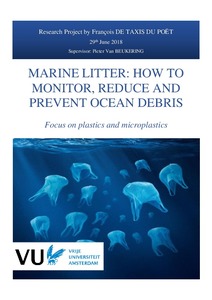| dc.contributor.author | De Taxis Du Poët, François | |
| dc.date.accessioned | 2020-06-29T22:22:48Z | |
| dc.date.available | 2020-06-29T22:22:48Z | |
| dc.date.issued | 2018 | |
| dc.identifier.citation | De Taxis Du Poët, F. (2018) Marine litter: How to monitor, reduce and prevent ocean debris. Focus on plastics and microplastics. Amsterdam, Netherlands, Vrie Universiteit, 52pp. DOI: http://dx.doi.org/10.25607/OBP-871 | en_US |
| dc.identifier.uri | http://hdl.handle.net/11329/1365 | |
| dc.identifier.uri | http://dx.doi.org/10.25607/OBP-871 | |
| dc.description.abstract | We live in the age of plastics. They are ubiquitous in our daily life and in many industrial applications. They play a major role in our economy. Their production continuously increases. However, plastics are not well managed and found their way to the oceans, leading to far-reaching environmental, health, social and economic impacts. Hence the challenge is to maintain the economic and societal benefits brought by plastics but avoiding that they end up in the environment.
Although there are knowledge gaps, the key elements are clear: 80% of marine litter is plastics. 94% is on the sea floor, only 1% is floating. Half of the marine litter are single use plastics. Marine plastic litter is found in high concentration on beaches, two orders of magnitude higher than anywhere else. The key points of intervention are beaches, wastewater treatment plants, and rivers. Floating plastics might therefore be less important than it can appear in the media.
Many efforts are being implemented at all levels, local, national, European, G7 and worldwide. However, plastics remain overall wrongly managed, in particular in Asia (China and South East Asia). Social awareness is increasing but so do the plastic ending into oceans. There is no one magic bullet solve-it-all solution. What counts most is the coherence between different solution to form a strong package of measures.
SWOT analysis of 4 main categories of measures (i) plastic removal, (ii) transformation/recycling, (iii) WWTP (Waste Water Treatment Plant), and (iv) monitoring, and 31 corresponding technologies were reviewed with their TRL (Technology Readiness Level) estimated.
Outcome indicates that the preferred solution in each category is: (i) beach clean-up as it is easy access, highly concentrated and shows strong economic benefits, (ii) Membrane technology appears to be the best technology for filtering microplastics (MPs) and this can be operated in a key intervention point (WWTPs), (iii) monitoring is necessary for informed policies but likely to be difficult and expensive. The FerryBox system appears the most promising but monitoring from space might be the technology that can bring a paradigm change as it did some years ago to measure plankton, and (iv) regarding transforming and recycling the tailor-made solution of Dutch start up “The Plastic Mining Cooperation” that develops for plastic waste on islands and coastal areas appears to be the “best” one, also cooperating with local environmental organizations and waste management companies they aim at turning waste into a resource.
Overall, three main conclusions emerged from the research project (i) Prevention is better than cure. There is still no solution found for the 94% of plastics on the sea floor, (ii) one size does not fit all. Technologies should be adapted to the social and industrial context of the point of intervention, and (iii) there is a need to develop at the same time long term and short-term approaches. It will be a long journey, but it starts now. | en_US |
| dc.description.sponsorship | H2020 CLAIM Project | en_US |
| dc.language.iso | en | en_US |
| dc.publisher | Vrie Universiteit | en_US |
| dc.subject.other | Marine litter | en_US |
| dc.subject.other | Plastic litter | en_US |
| dc.subject.other | Plastic debris | en_US |
| dc.subject.other | Marine plastics | en_US |
| dc.subject.other | Microplastics | en_US |
| dc.subject.other | CLAIM Project | en_US |
| dc.title | Marine litter: how to monitor, reduce and prevent ocean debris. Focus on plastics and microplastics. | en_US |
| dc.type | Report | en_US |
| dc.description.status | Published | en_US |
| dc.format.pages | 52pp. | en_US |
| dc.description.refereed | Refereed | en_US |
| dc.publisher.place | Amsterdam, Netherlands | en_US |
| dc.subject.parameterDiscipline | Parameter Discipline::Environment::Anthropogenic contamination | en_US |
| dc.description.currentstatus | Current | en_US |
| dc.description.sdg | 14.1 | en_US |
| dc.description.bptype | Manual (incl. handbook, guide, cookbook etc) | en_US |
| obps.contact.contactname | Francois De Taxis Du Poët | |
| obps.contact.contactemail | claim@hcmr.gr | |
| obps.resourceurl.publisher | https://www.claim-h2020project.eu/publications/ | en_US |
 Repository of community practices in Ocean Research, Applications and Data/Information Management
Repository of community practices in Ocean Research, Applications and Data/Information Management
